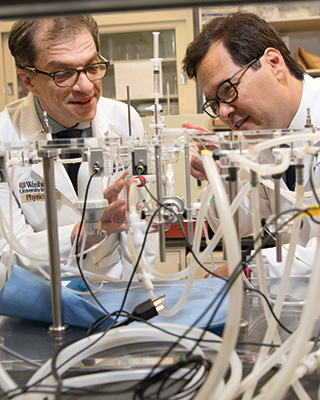Transplant program gets top outcomes rating

In 2016, as it celebrated two major milestones, the Washington University and Barnes-Jewish Lung Transplant Program was recognized for generating among the nation’s best lung transplant outcomes. The program received the highest rating from the Scientific Registry of Transplant Recipients, an evaluation based on the percentage of patients surviving with a functioning transplanted lung one year after transplant. Only four out of 77 centers received this rating. The program also became one of the few U.S. centers to perform 1,500 total adult lung transplants, and for the year, surgeons performed 83 — a hospital record.
Cardiothoracic surgeon Keki Balsara, MD, presented the center’s long-term outcomes at the American Association for Thoracic Surgery 2017 Annual Meeting, comparing survival rates among patients who received transplants before and after the national system changed in 2005 to allocate lungs based on disease severity rather than wait time. The five-year survival rate increased from 56.8 percent to 68.3 percent, the latter being among the highest survival rates reported to date.
Daniel Kreisel, MD, PhD, surgical director of the Lung Transplant Program, attributes the group’s success to several factors. “We have a strong multidisciplinary approach and a very good supporting staff. Improvements in immunosuppression, perioperative care and treating chronic rejection also benefit patients,” he says.
In addition, the program has a long-standing policy of performing only double-lung transplants, which yield better outcomes than single-lung transplants.
Kreisel and researcher Andrew Gelman, PhD, also advance lung transplant treatment through the National Institutes of Health (NIH)-funded Thoracic Immunobiology Laboratory, based at Washington University. Gelman’s lab discovered that an enzyme therapy currently used to avoid tissue damage at the time of transplant may inhibit the ability of immunosuppressants to promote survival; his lab is testing potential remedies. Kreisel’s research has identified a new immunological pathway that causes lung rejection. And postdoctoral research fellow Hsi-Min Hsiao, PhD, has described cellular mechanisms that contribute to primary graft dysfunction — a syndrome of tissue damage that is a major cause of early death and long-term complications.
“Our collaborative work has yielded experimental tools to help understand what causes lung transplant rejection, information that can be used to identify new approaches to treat it,” says Gelman.
Highlights

PERFORMING ROBOTIC THORACIC SURGERIES and training cardiothoracic surgery fellows in the technique is a priority of section surgeons Varun Puri, MD, MSCI, and Benjamin Kozower, MD, MPH. In addition, former fellow Alex Bribriesco, MD, and current fellow Ruben Nava, MD, have received fellowships from the American Association for Thoracic Surgery and the company Intuitive Surgical to undergo online training in robotics and to use inanimate models and cadavers to gain hands-on skills. The fellowship also requires attending surgeons to expose fellows to a set amount of robotic cases in a fixed amount of time after training.
VARUN PURI, MD, MSCI, has been named associate surgical director of the Washington University and Barnes-Jewish Lung Transplant Program. Puri has an active lung transplant practice and an interest in clinical-outcomes research. As associate director, he will work with pulmonologists to establish a single clinical database of lung transplant cases to drive quality assurance and quality-improvement projects. Currently, multiple databases hold lung transplant information.
STRONG BASIC SCIENCE and clinical-outcomes research are among the section’s attributes. Puri, Bryan Meyers, MD, MPH, and Benjamin Kozower, MD, MPH, have contributed to major findings in treatment outcomes for early stage lung and esophageal cancer and surveillance after lung cancer surgery. Having three general surgery residents — Tara Semenkovich, MD, MPHS, Jessica Hudson, MD, MPHS, and Melanie Subramanian, MD — who focus their research this year on clinical outcomes in thoracic surgery is another testament to the section’s strength in this area.
ANDREW GELMAN, PHD, has been named the Jacqueline G. and William E. Maritz Professor of Surgery, Pathology and Immunology.
Noted accomplishment

BRYAN MEYERS, MD, MPH, chief of the Section of Thoracic Surgery and the Patrick and Joy Williamson Professor of Surgery, became chair of the American Board of Thoracic Surgery (ABTS) in September 2017. The ABTS oversees certification of thoracic surgery training program graduates and ongoing maintenance of certification for certified thoracic surgeons. Meyers already has led efforts to make the recertification exam less punitive and more of a learning process.